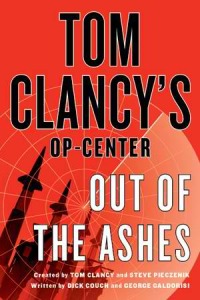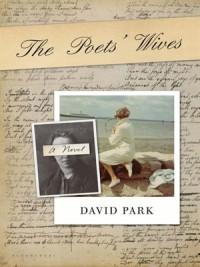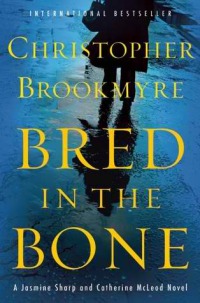Tom Clancy's Op-Center: Out of the Ashes by Dick Couch and Steve Pieczenik
 Friday, May 30, 2014 at 8:33AM
Friday, May 30, 2014 at 8:33AM 
Published by St. Martin's Griffin on May 20, 2014
Early in his career, when he was still at his best, Tom Clancy wrote carefully researched, credible thrillers. Clancy co-created the Op-Center series but Jeff Rovin wrote the novels that appeared between 1995 and 2005. Although Clancy died in 2013, his name appears in the largest font on the cover of of Out of Ashes, while the names of the actual authors appear in the smallest font. If not for the Clancy name, I suspect few people would buy this lackluster book.
The Op-Center uses the same notion as Brad Taylor's Taskforce novels -- a covert unit operates with the knowledge of the president but without congressional authority, doing what it needs to do to protect the country. The difference is that Taylor's books are smart, lively, and nuanced while Out of Ashes is dull, half-baked, and preposterous.
Out of Ashes is a strikingly unimaginative story that begins with a Kuwaiti blowing up football stadiums. How he manages to carry out his coordinared attacks is glossed over, probably because the authors couldn't think up a way to make it work. How does the Kuwaiti "hack" into the PA systems of nine football stadiums to play chaos-inducing recordings at the same moment? Where does he get enough C4 to blow up four stadiums and why does nobody notice when he places it in position? We never learn the answers because the writers have none.
In any event, the president decides it is time to get the Op-Center back in business, a task that occupies the first quarter of the novel. After many "earnest discussions" which consist of characters telling each other how great they are, Chase Williams is chosen to head the revived Op-Center. His brilliant idea is to hire computer geeks to do intelligence analysis (gee, why didn't NSA think of that?). The second quarter of the novel introduces more characters and laboriously sets up the meager plot. The plot involves an obvious ploy by a Saudi prince to provoke the U.S into attacking Syria -- so obvious it's difficult to think anyone would be duped by it.
Every time a new character is introduced, we get dry biographical details that might appear on a job application. The authors are also quite concerned that we know the brand name of every article of clothing worn by American characters. Educational backgrounds and choice of clothing designers is apparently a substitute for character development, as the characters (most of whom favor Brooks Brothers) have not the slightest hint of a personality. Characters spend a lot of time telling each other things they already know, a weak writing technique that educates the reader at the expense of realistic dialog.
The terrorists who supposedly provided a justification for reconstituting the Op-Center are gone before a quarter of the novel has passed, and the Op-Center does nothing substantive for the rest of the book, making me wonder why a novel about the anti-terrorist Op-Center had so little to do with the Op-Center or with terrorism. Apparently realizing that they had written a scattered novel that isn't about anything, the authors make a belated attempt to introduce a new terrorist threat with a brand new character late in the novel. That plot thread is even sillier than the story that precedes it. Again, how the terrorist manages to acquire the things he needs to carry out his planned attack is never explained, and how the geeks tumble to the plot is explained only by the assurance that they have outstanding "system parameters."
The novel is heavy on jargon and military procedure but light on credibility. The first geek hired by Op-Center to analyze intelligence immediately figures out who is responsible for the stadium bombings. How he does this and why no one else could do it is never explained. How operatives of a Saudi prince manage to blackmail a key employee of a defense contractor to obtain security codes to a Global Hawk surveillance aircraft also goes unexplained, and we are never told why his American employer doesn't notice his comings and goings in Saudi Arabia. Just about every character in the military is portrayed as incompetent or unprofessional, from a ship's captain who disregards blindingly obvious evidence of his misjudgment to a helicopter pilot who decides to make an illegal detour over foreign air space because her friend thinks it would be a good idea. The novel's abrupt ending (Out of Ashes is apparently intended only to set up future books in the series) is just ridiculous.
A few action scenes add a spark of life to an otherwise boring story that primarily focuses on tiresome conversations among wooden characters. There are too few action scenes to redeem the novel as a whole. Terrorists manage to kill a lot of Americans during the course of the novel but story generates about as much emotion as a cricket match stirs in boxing fans. I'm sure this novel will sell since it has Tom Clancy's name on it, but I'm not sure that very many readers will be happy to have wasted their time and money on it.
NOT RECOMMENDED
 TChris |
TChris |  Post a Comment |
Post a Comment |  Dick Couch,
Dick Couch,  Steve Pieczenik in
Steve Pieczenik in  Thriller
Thriller 

